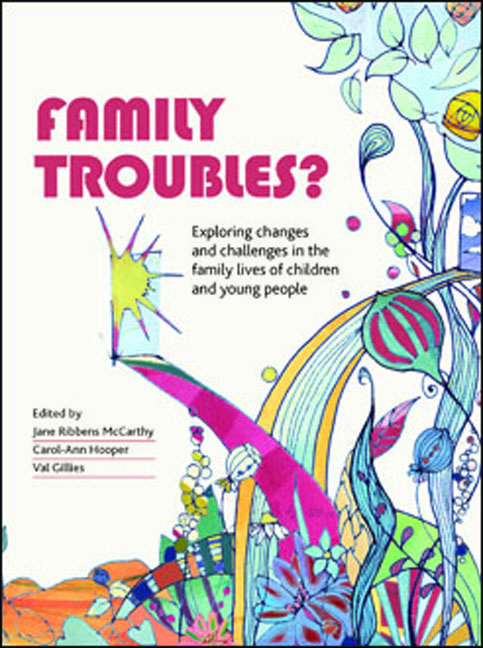Book contents
- Frontmatter
- Contents
- Notes on contributors
- Foreword
- Preface
- 1 Troubling normalities and normal family troubles: diversities, experiences and tensions
- Part One Approaching family troubles ? Contexts and methodologies :Introduction to Part One
- Part Two Whose trouble ? Conteste d definitions and practice: Introduction to Part Two
- Part Three The Normal, The Troubling And The Harmful?: Introduction to Part Three
- Part Four Troubles and transitions across space and culture: Introduction to Part Four
- Part Five Working With Families: Introduction to Part Five
- Index
15 - Children and family transitions: contact and togetherness
Published online by Cambridge University Press: 07 September 2022
- Frontmatter
- Contents
- Notes on contributors
- Foreword
- Preface
- 1 Troubling normalities and normal family troubles: diversities, experiences and tensions
- Part One Approaching family troubles ? Contexts and methodologies :Introduction to Part One
- Part Two Whose trouble ? Conteste d definitions and practice: Introduction to Part Two
- Part Three The Normal, The Troubling And The Harmful?: Introduction to Part Three
- Part Four Troubles and transitions across space and culture: Introduction to Part Four
- Part Five Working With Families: Introduction to Part Five
- Index
Summary
In the global North, the issue of children's contact with parents following parental separation and divorce has been much discussed as a social, political and legal concern, and as a key site for contemporary family negotiations. The issue draws into focus, both at a societal and family level, the question of who counts as family and kin, the obligations ascribed to parent–child relationships, and, specifically, the expectations of the appropriate frequency and quality of contact time between non-resident parents, usually fathers, and their children (Hogan et al, 2003; Natalier and Hewitt, 2010). Negotiations around contact also take place at a micro-level, in the form of family practices in which children participate.
Typically, sociological research on children's contact with family members focuses on children's perspectives on their post-separation and post-divorce contact with their parents (Wade and Smart, 2002; Hogan et al, 2003; Moxnes, 2003a, 2003b). This research shows that parental separation and divorce are increasingly becoming part of the ordinary experience of childhood. Despite the ordinariness of these experiences, international large-scale findings suggest that separation and divorce cause notable, but often short-term, distress for the majority of children (Fomby and Cherlin, 2007; Elliott and Vaitilingam, 2008; Coleman and Glenn, 2010). For some children and young people, longer-term consequences include a negative impact on their educational success and well-being into adulthood (Fomby and Cherlin, 2007; Elliott and Vaitilingam, 2008; Coleman and Glenn, 2010). Longer-term troubles are more likely where conflict between parents continues post-separation, where parent–child relationships are poor (which may include lack of communication with children over the decision to separate and lack of contact with a non-resident parent afterwards), where there are multiple transitions in family formation, where mothers’ mental health suffers and where the family live in poverty (Hawthorne et al, 2003; Coleman and Glenn, 2010). Despite the normality of separation and divorce for children in the North, children's experiences of these processes remain troubling, although the extent of these troubles depends upon a complex mixture of circumstances, and support from grandparents, siblings and friends may all protect from long-term harm.
Children's own accounts of contact following separation and divorce often demonstrate a desire to re-establish a sense of normality, and to feel like a family once again.
- Type
- Chapter
- Information
- Family Troubles?Exploring Changes and Challenges in the Family Lives of Children and Young People, pp. 185 - 194Publisher: Bristol University PressPrint publication year: 2013
- 1
- Cited by

